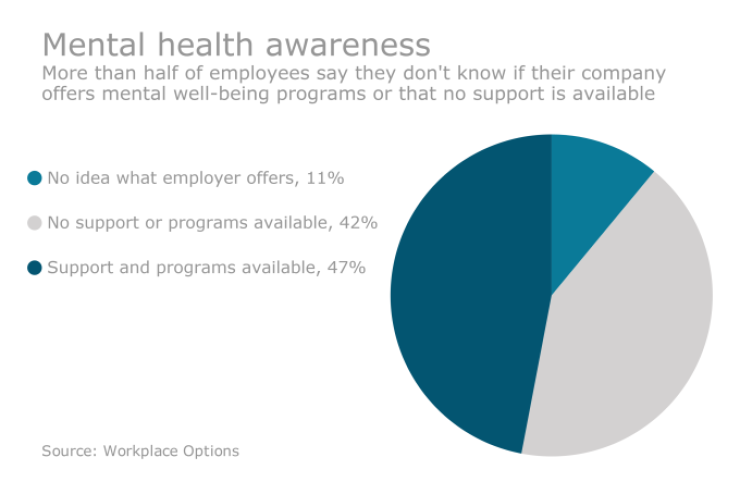Mental illness can become evident in many different ways. Some conditions affect a person’s thinking, feeling or mood and vary from mild to severe. Mental health problems can also affect someone’s ability to relate to others and function each day. Every person will have different experiences, even those with the same diagnosis.
When looking specifically at workplace productivity, depression, anxiety and substance use cast a heavy burden on an employee. These behavioral health conditions exact an enormous personal and social cost, affecting not only a person’s health but also his or her ability to work.
Did you know?
· In the United States, 43.7 million adults suffer from a mental, behavioral or emotional disorder.
· Mental illness causes more days of work loss and work impairment than any other chronic health conditions, including arthritis, asthma, back pain, diabetes, hypertension and heart disease.
· The Partnership for Workplace Mental Health estimates that mental illness and substance abuse annually costs employers about $80 to $100 billion in indirect costs alone.
· The World Health Organization predicts that by 2020, depression will cause more days of work loss and work impairment than any other illness.
See also:

The good news is that common mental health problems, such as depression, anxiety and substance use, are treatable with medication and non-drug therapies. Much progress has been made in the last two decades in treating mental illnesses. Treatment type varies by the condition, but most mental health conditions can be effectively treated with one or a combination of the following therapies: medications, group therapy, cognitive-behavior therapy or behavior modification. Early engagement and support markedly improve the outcomes of treatment, and enhanced interventions that integrate mental health promotion strategies into the workplace can be a part of the solution.
See also:
Research findings
The best evidence for the effectiveness of enhanced mental health interventions in the workplace has come from studies of people with depression. In a 2007 study published in the Journal of the American Medical Association, a group of researchers at Harvard found that “a systematic telephonic outreach and care management program to identify depression and promote effective treatment significantly improved both the symptoms of depression and workplace outcomes.” Participants engaged in the program had significantly higher job retention and worked more hours. Other researchers have also found evidence that work-directed interventions targeting depression enhanced the clinical treatment of the disease, reduced the number of days on sick leave and presented a cost-effective human capital investment for employers.
Barriers
Unfortunately, there are a number of barriers to effectively addressing mental health problems in the workplace. These include persistent misconceptions of mental illness, along with the surrounding stigma and discrimination against those with mental health problems. In one study, employers were seven times more likely to recommend hiring an applicant with a physical disability like a wheelchair user than a mental illness, such as someone taking medication for anxiety and depression.
See also:
Employees are less likely to use workplace mental health support resources if they perceive their office as an unsupportive environment.
Even employees who would benefit from accommodation and support must weigh the workplace culture and their own personal beliefs with their need for enhanced mental health interventions in the workplace.
CEO Summit on Mental Health
Last year, the National Alliance on Mental Illness of New York City and the Northeast Business Group on Health sponsored the CEO Summit on Mental Health, which brought together CEOs from 12 different companies to discuss fostering a workplace that promotes, supports and improves the mental health of employees and their families. The forum identified four key principles that inform successful workplace efforts to support and foster better mental health.
Know the impact
Understand the impact that mental illness has on the well-being of employers and employees.
Break the silence
Nurture an environment that erases the stigma of mental illness.
Deliver affordable access
Provide individuals with mental illness access to quality mental healthcare.
Build a culture of well-being
Create a workplace that encourages individuals to support their own overall physical and mental health.
See also:
Many employers recognize that there is a strong business case for investing in the programs and services necessary to create a mentally healthy workforce. Research has demonstrated that efforts to enhance the treatment of common mental health problems in the workplace reduce employee absenteeism, increase productivity and are a cost benefit to companies. By using a few key principles, employers can build a culture of well-being that promotes, supports, and improves the mental health of employees and their families.





